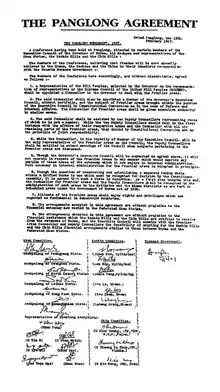| Panglong Agreement | |
|---|---|
 | |
| Ratified | 12 February 1947 |
| Location | Panglong, Shan States |
| Signatories | Aung San, ethnic Kachin, Chin and Shan representatives |
| Purpose | Established autonomy for the Chin, Kachin and Shan peoples |
The Panglong Agreement (Burmese: ပင်လုံစာချုပ် [pɪ̀ɰ̃ lòʊɰ̃ sà dʑoʊʔ]) was reached in Panglong, Southern Shan State, between the Burmese government under Aung San and the Shan, Kachin, and Chin peoples on 12 February 1947. The agreement accepted "full autonomy in internal administration for the Frontier Areas" in principle and envisioned the creation of a Kachin State by the Constituent Assembly. It continued the financial relations established between the Shan states and the Burmese federal government, and envisioned similar arrangements for the Kachin Hills and the Chin Hills. The anniversary of this agreement is celebrated annually as Union Day.[1]
Signatories
Aung Zan Wai, Pe Khin, Bo Hmu Aung, Sir Maung Gyi, Dr. Sein Mya Maung, Myoma U Than Kywe were among the negotiators of the historical Panglong Conference negotiated with Bamar leader General Aung San and other ethnic leaders in 1947.
In popular culture
In 1973, Sai Kham Leik composed the Shan language song, "Lik Hom Mai Panglong" (Shan: လိၵ်ႈႁူမ်ႈမၢႆပၢင်လူင်, lit. 'Panglong Agreement'), for Sai Hsai Mao, and remains a pop classic.[2][3]
See also
References
- ↑ "Myanmar Government holiday page". Archived from the original on 23 January 2022. Retrieved 4 February 2009.
- ↑ Jirattikorn, Amporn (2010). "Shan noises, Burmese sound: crafting selves through pop music". South East Asia Research. 18 (1): 161–189. ISSN 0967-828X.
- ↑ Ferguson, Jane (2016). "I Was Cool When My Country Wasn't: "Mao" and "Deng" Making Transnational Music in the Golden Triangle". Asian Music. 47 (2): 114–137. doi:10.1353/amu.2016.0018.
External links
 Works related to Panglong Agreement at Wikisource
Works related to Panglong Agreement at Wikisource- Text of the Panglong Agreement
- Ethnic Peace Plan 2014
- Celebration of Panglong Agreement Day